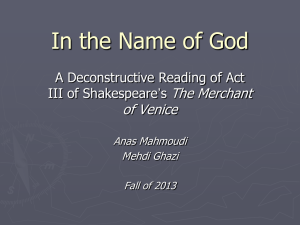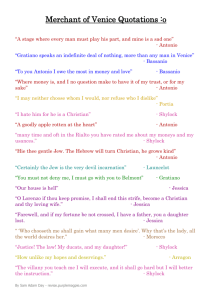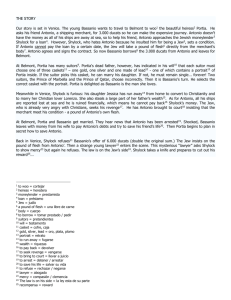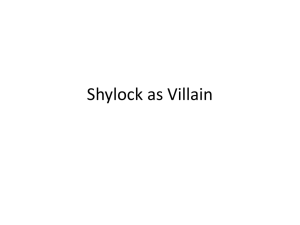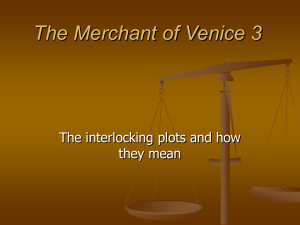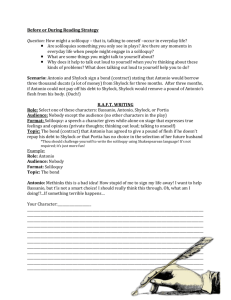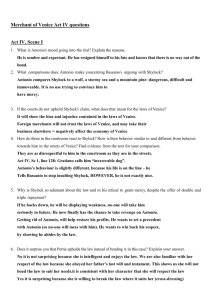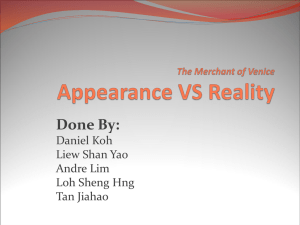AMerchant of Venice Act I and II Study Questions Act I, Scene I
advertisement
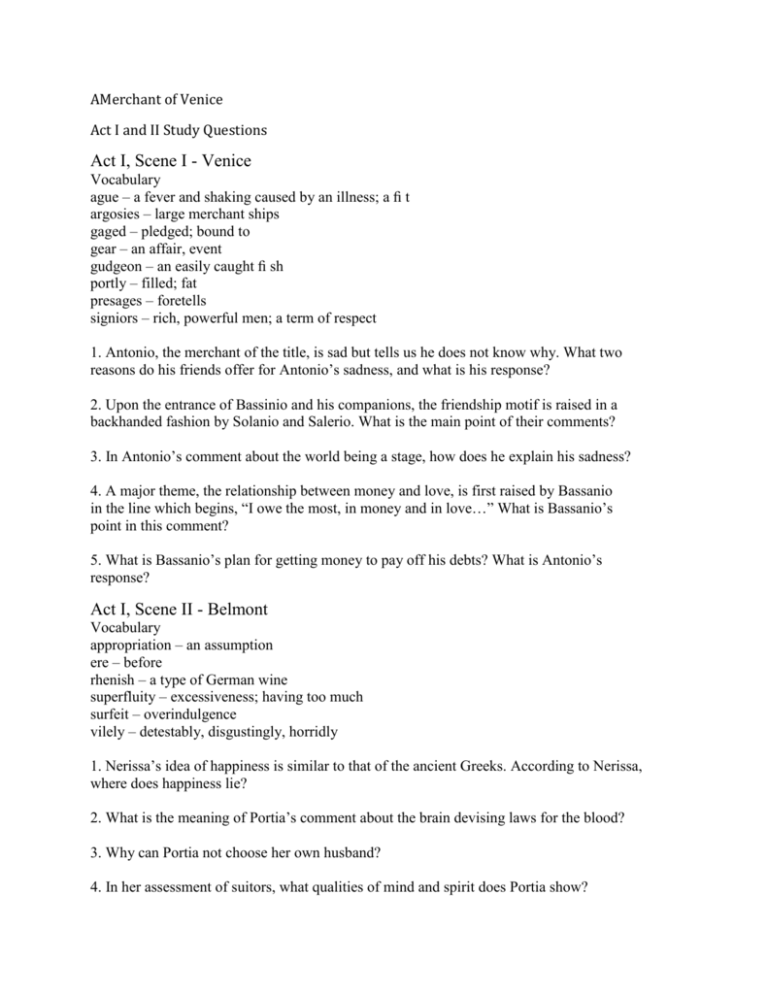
AMerchant of Venice Act I and II Study Questions Act I, Scene I - Venice Vocabulary ague – a fever and shaking caused by an illness; a fi t argosies – large merchant ships gaged – pledged; bound to gear – an affair, event gudgeon – an easily caught fi sh portly – filled; fat presages – foretells signiors – rich, powerful men; a term of respect 1. Antonio, the merchant of the title, is sad but tells us he does not know why. What two reasons do his friends offer for Antonio’s sadness, and what is his response? 2. Upon the entrance of Bassinio and his companions, the friendship motif is raised in a backhanded fashion by Solanio and Salerio. What is the main point of their comments? 3. In Antonio’s comment about the world being a stage, how does he explain his sadness? 4. A major theme, the relationship between money and love, is first raised by Bassanio in the line which begins, “I owe the most, in money and in love…” What is Bassanio’s point in this comment? 5. What is Bassanio’s plan for getting money to pay off his debts? What is Antonio’s response? Act I, Scene II - Belmont Vocabulary appropriation – an assumption ere – before rhenish – a type of German wine superfluity – excessiveness; having too much surfeit – overindulgence vilely – detestably, disgustingly, horridly 1. Nerissa’s idea of happiness is similar to that of the ancient Greeks. According to Nerissa, where does happiness lie? 2. What is the meaning of Portia’s comment about the brain devising laws for the blood? 3. Why can Portia not choose her own husband? 4. In her assessment of suitors, what qualities of mind and spirit does Portia show? 5. Near the end of the scene, Nerissa tells us that the suitors have decided to return home without choosing a casket. Why? 6. Which former visitor to her father’s palace does Portia remember as a praiseworthy, prospective suitor? What does her comment, “I remember him well, and I remember him worthy of thy praise,” foreshadow? Act I, Scene III - Venice Vocabulary eanlings – lambs, kids fulsome – lustful imputation – negative charges, incriminations publican – a tax collector squandered – scattered 1. Is Shylock’s refusal to have dinner with Antonio and Bassanio based on religious or societal grounds? 2. In the aside that follows, what do we learn of Shylock’s real feelings toward Antonio? For what three reasons does he feel this way? 3. When Shylock makes the following comments, what is his meaning? “If I can catch him once upon the hip, I will feed fat the ancient grudge I bear him.” 4. What is Antonio’s meaning in the following passage? “Shylock, albeit I neither lend nor borrow By taking nor by giving of excess…” Why is Antonio’s position on lending money different from that of Shylock? 5. As Antonio presses for Shylock’s answer, Shylock reveals what he considers are some insults he has received from the hand of Antonio. What are they? 6. What is Antonio’s response to Shylock? 7. How can we account for Antonio’s generosity concerning Bassanio, but his discourteous behavior toward Shylock? 8. Shylock rejects Antonio’s notion that he views Antonio as an enemy. Shylock says he will lend the money out of friendship, without charging any interest. What bond does Shylock propose that Antonio fulfill if the loan is not paid in ninety days? In what spirit does he claim he makes this proposal? 9. What is Antonio’s reaction? Bassanio’s reaction? 10. What does Shylock say in response to Bassanio’s objection to the bond? 11. Why is the following line an example of an ellipsis? “My ships come home a month before the day.” Act II, Scene I - Belmont Vocabulary livery – a uniform, clothing valiant – brave 1. Of what condition does Portia inform the Prince of Morocco, and what is his response? Act II, Scene II - Venice Vocabulary allay – to relieve cater-cousins – not great friends cudgel – a club demurely – shyly ergo – therefore frutify – certify sand-blind – dim-sighted sonties – saints 1. By what decision is Launcelot Gobbo torn? Which way is his conscience pulling him? 2. Usually servants and other lower-class people are comic figures in a Shakespearean play. Their language is always in prose, not verse; frequently they muddle their words and engage in word play and puns. Does Launcelot Gobbo seem to fi t this picture? 3. As father and son speak to Bassanio, Bassanio becomes exasperated. What makes this scene comic? 4. What are some malaprops you note in Old Gobbo’s comments? 5. When Gratiano asks Bassanio if he may accompany him to Belmont, what is Bassanio’s response? Act II, Scene III - Shylock’s house, Venice Vocabulary (No Vocabulary) 1. A frequent subplot in comedies has is that of lovers who defy a parent and elope. What further twist to this subplot is there in Jessica’s proposed elopement? 2. In this regard, contrast Portia and Jessica. Why do you suppose Shakespeare’s audience would not have thought less of Jessica? Act II, Scene IV - Venice Vocabulary (No Vocabulary) 1. The conversation at the opening of this scene seems to make little sense until we learn that the young men are preparing for a masque. What is a masque, and what do they need a torchbearer for? 2. What further action do we learn Jessica plans to take when she leaves her father’s house? What is Lorenzo’s reaction to this news? 3. In what two senses may we take Lorenzo’s comment that tonight Jessica will be his torchbearer? Act II, Scene V - Shylock’s house, Venice Vocabulary fife – a type of flute foppery – silliness gormandise – to eat greedily masque – a masquerade, costume party prodigal – extremely wasteful 1. Who is “the prodigal Christian,” and why does Shylock accept a dinner invitation that he has previously declined? 2. What sense of foreboding does Shylock have about leaving the house? 3. What final instructions does Shylock give Jessica? How do these comments seem to aid in justifying Jessica’s behavior and decision? 4. What message does Launcelot pass to Jessica? Act II, Scene VI - Shylock’s house, Venice Vocabulary abode – a delay scarfed – decorated with untread – retrace 1. From the window, Jessica throws the casket to Lorenzo; it contains Shylock’s wealth. As she does, she says that she is glad it is night because she is ashamed of her exchange: “But love is blind and lovers cannot see The pretty follies that themselves commit…” What becomes clear only in the last line of that speech? To what exchange is she referring? Act II, Scene VII –Belmont Vocabulary cerecloth – a cloth used in embalming immured – imprisoned 1. The Prince chooses the gold casket. What is the message he receives? Act II, Scene VIII - Venice Vocabulary amorous – devoted miscarried – failed; wrecked 1. Why do Shylock and the Duke, the chief legal official, go to search Bassanio’s ship? 2. Shylock’s reaction to his daughter’s elopement is probably a comical scene for the Elizabethans. How does he behave? 3. What ominous comment does Solanio make about this development and how it will affect Antonio? 4. In this regard, what news has Salerio heard that worries him? Why? 5. How is the bond of friendship, love, and money further developed in this scene? Act II, Scene IX - Belmont Vocabulary alighted – dismounted anon – immediately chaff – straw commends – compliments courteous breath – flattery injunctions – commands, directions martlet – a type of bird merit – excellence new-varnish’d – glossed over pries – investigates solemnized – performed 1. We finally learn all three conditions that a suitor agrees to when he makes a choice of caskets. What are these three conditions? 2. What is Arragon’s choice? What does he find in the casket, and how does he seem to Respond? 3. What news does the servant girl bring, and what is Portia’s witty response?
